I was truly captivated by the stunning beauty of the restored Conciergerie clock, a sight that surprised me as much for its splendour and historical significance.
This ornate gilded clock adorns the Clock Tower of the Conciergerie.
It is a remarkable piece of historical craftsmanship, a landmark that has witnessed centuries of Parisian history.
This is France’s first public clock, perched at the intersection of Quai de l’Horloge and Boulevard du Palais in the 1st arrondissement of Paris.
Its presence is not just a functional piece but a symbol of the city’s enduring heritage.
The Conciergerie Clock: A Historic Landmark in Paris

The Clock Tower of the Conciergerie
The French monarchy was based in the Middle Ages at the Palais de la Cité.
But in 1370, during the Hundred Years’ War, Charles V decided to pack up and move to the Louvre.
He left his castle to the judicial and prison authorities, who quickly turned it into a vast, gloomy jail for the many convicts from the Paris region.
The Clock Tower (Tour de l’Horloge) was built between 1350 and 1353.
It is the Conciergerie‘s tallest tower, rising at 47 metres.
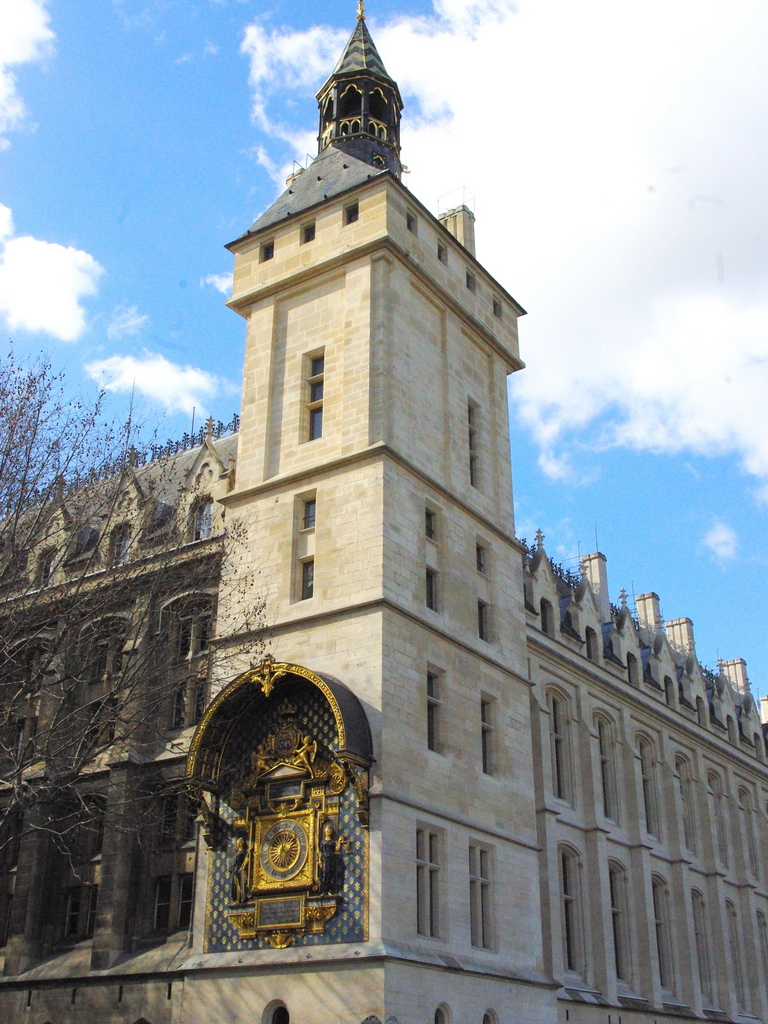
The King’s Order for a Public Clock in Paris
At that time, Parisians had few options for telling the time.
They had to rely on sundials scattered around the city walls or listen for the church bells.
Charles V, always thinking about the comfort of his people, decided to take action.
He asked Henri de Vic, a clockmaker from Lorraine, to create Paris’s first large public clock.
This clock was installed on the eastern façade of the tower at the Palais de la Cité in 1371.
The clock, covered in gold leaf and decorated with a beautiful blue mantle dotted with fleurs-de-lis, was a true work of art.
Its large bells chimed every hour, day and night.
And when it came to announcing royal births, weddings, or deaths, those bells would go all out with a loud, ringing carillon that echoed across Paris.
The clock quickly became a crucial part of daily life for Parisians.

A New Enhanced Clock in the 16th Century
But, exposed to the elements, it began to wear down over time.
So, in 1585, Henri III commissioned Germain Pilon with a significant restoration and asked for even more decorations to be added.
A gilded clock still in place enhanced the clock. It featured a multicoloured face with allegories of Law and Justice framing the actual clock.
The events of the French Revolution severely damaged it.
However, clockmaker Lepaute did not restore it until 1849.
Finally, during the latest restoration, old documents from the National Library inspired the restorers.
The restoration programme ended in 2012 and gave the clock its initial splendour.
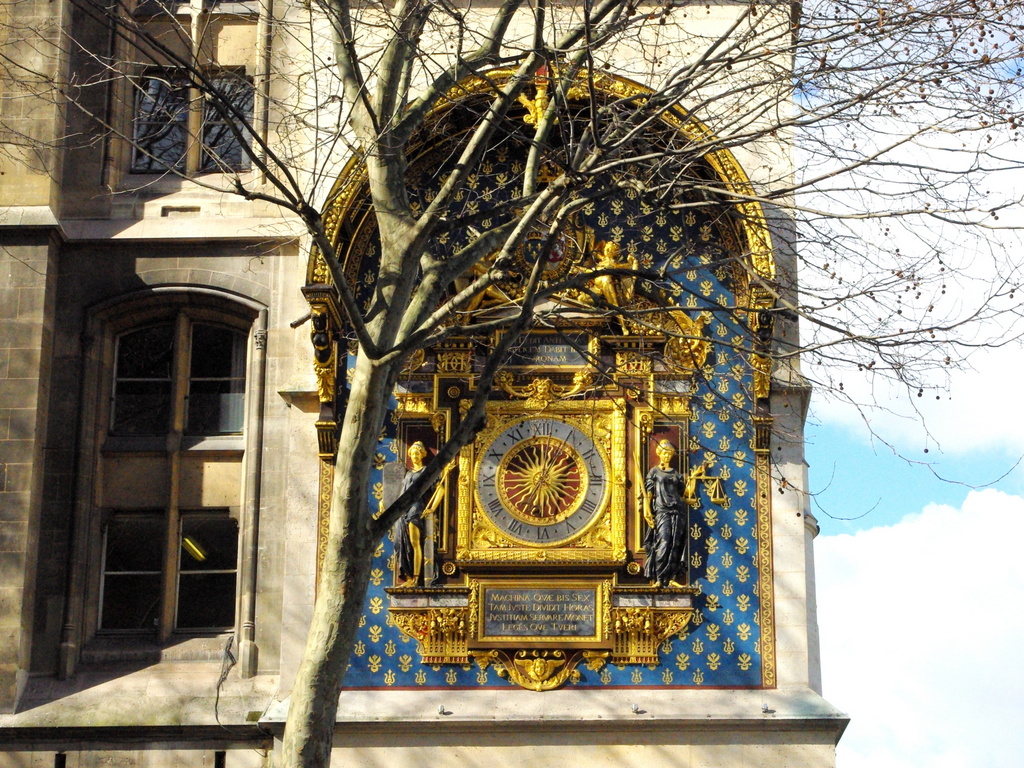
A Little Guide to the Conciergerie Clock
The entire piece is framed by an arch with intricate gold detailing, making it not just a functional timepiece but also a work of art and a symbol of the location’s historical significance.

The squared clock at the centre
The clock consists of a square 1.5 metres wide.
It is set within a richly decorated framework featuring a deep blue background adorned with golden fleurs-de-lis, a symbol of French royalty.
More precisely, two different types of fleur-de-lys have been used.

The arms of the clock
The clock has a round face with Roman numerals marking the hours and a golden sunburst design at the centre, from which the clock’s hands radiate.
The long arm of the clock depicts an arrow, while the shorter has a fleur-de-lys at its tip.

The Latin inscriptions
Below the clock, a Latin inscription reads:
“MACHINA QUAE BIS SEX TAM JUSTE DIVIDIT HORAS, JUSTITIAM SERVARE MONET LEGESQUE TUERI”
English translation:
“This mechanism which divides time into perfectly equal twelve hours helps you to protect justice and defend the law”.

Then, above the clock, another inscription refers to King Henri III (1551-1589):
“QUI DEDIT ANTE DUAS TRIPLICEM DABIT ILLE CORONAM”
English translation:
“He who has already given two crowns will be given a third.”

Henri III was first Grand Duke of Lithuania, then King of Poland, before becoming King of France.
The inscription is a fitting tribute, as he was destined to father the heir to the French throne.
The Crests of France and Poland
You can also spot two crests held by two angels above—one with fleurs-de-lis for France and the other with an eagle on a red background for Poland.

The small allegorical statues
Two small statues were placed on either side of the clock face.
On the right, the Greek goddess Themis stands as a symbol of Justice.

She holds a sword in her right hand, representing punishment, and a scale in her other hand, reflecting the divine justice of the Royal power.
On the left, another statue represents the Law, holding a sceptre and a tablet with a Latin inscription:
“SACRA DEI CELEBRARE PIVS REGALE TIME IVS.”
This translates to “Revere the sacred and respect royal law!”
It reminded Parisians of that era that it was wise to submit to the king’s authority.

The monograms beneath the roof
Just beneath the roof, you’ll notice some intriguing monograms.
These date from a more recent restoration and are a tribute to notable members of the monarchy, expressed as intertwined initials.
The overlapping “H” and “C” are a nod to Henri II and Catherine de’ Medici.
Next to them, you’ll find intertwined “H” and “M” initials, representing a royal couple infamous for their affairs: Henri IV, the notorious flirt known as “Le Vert Galant,” and Marguerite de Valois, better known as the scandalous “Reine Margot”!

The Plane-Tree Controversy!
You might notice that my photos were taken in winter when the absence of foliage allows me to fully appreciate the clock’s beauty.
There’s a large plane tree standing in front of the clock tower, and as soon as spring arrives, its thick leaves start to obscure the clock’s splendour.
This has actually sparked a bit of controversy among local heritage enthusiasts in Paris.
Despite the growing concern, the Paris city council has so far refused to cut down the tree, which seems to gain more ground every year.
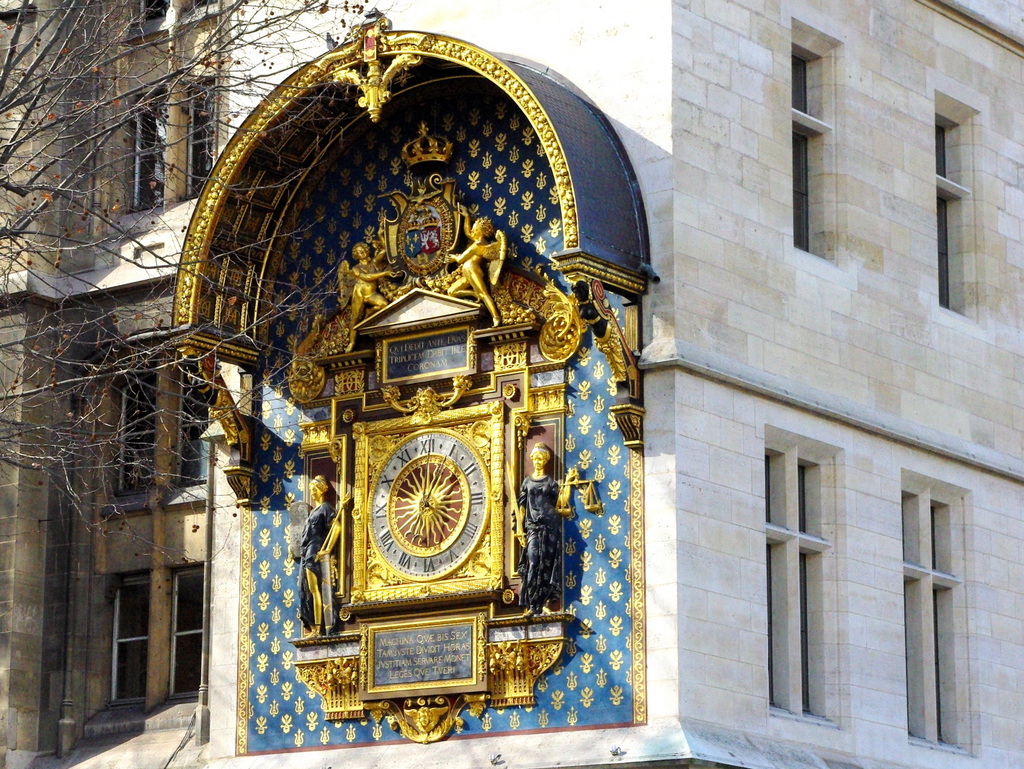
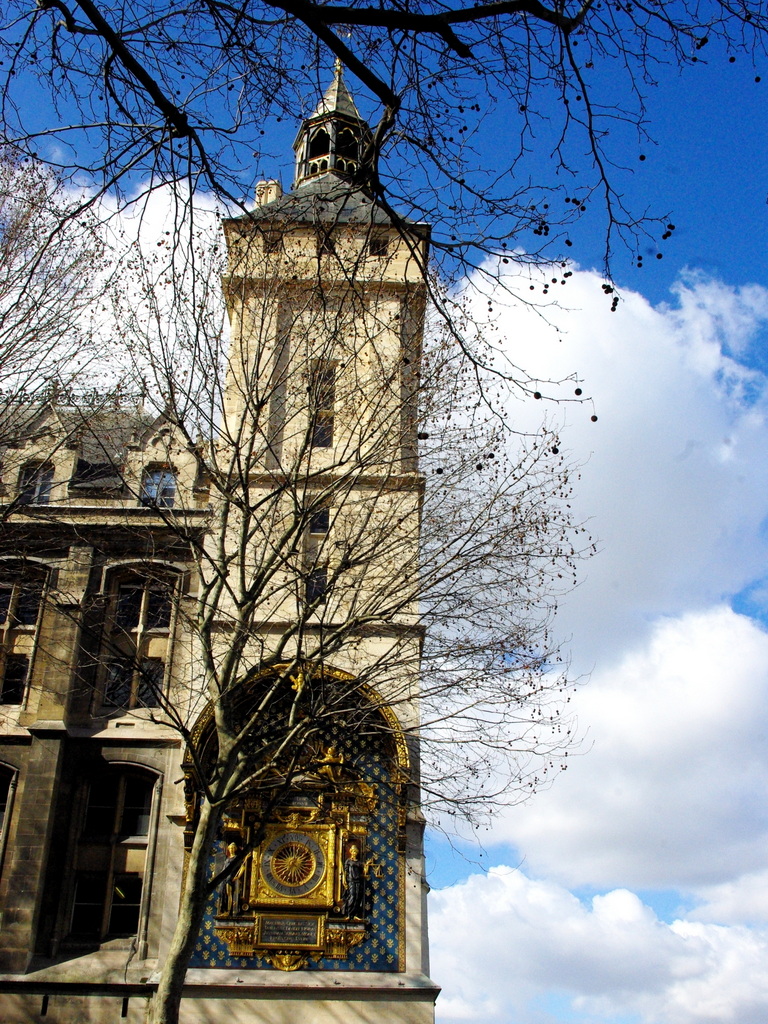
Where to find the clock?
The Conciergerie Clock is located on the Île de la Cité, right in the heart of Paris.
Specifically, you’ll find it on the eastern façade of the Conciergerie, at the corner where Quai de l’Horloge meets Boulevard du Palais.
The clock is prominently positioned on the Clock Tower, part of the historic Palais de la Cité, a site with deep ties to French history.
To get there, you can easily take a stroll from other major attractions like Notre Dame Cathedral or Sainte-Chapelle, both of which are just a short walk away on the same island.
If you’re using public transport, the closest Metro station is “Cité” on Line 4, which drops you off right on the Île de la Cité. From there, it’s just a few minutes’ walk to the clock.
Alternatively, you can also arrive from the station “Pont-Neuf” on Line 7.
When visiting, keep in mind that the clock is best viewed during the winter months when the nearby plane tree’s foliage doesn’t obstruct the view.
But even in other seasons, this beautiful piece of Parisian heritage is worth a visit, even if partially hidden by the leaves.
- Get your Priority Entrance eTickets to the Conciergerie.
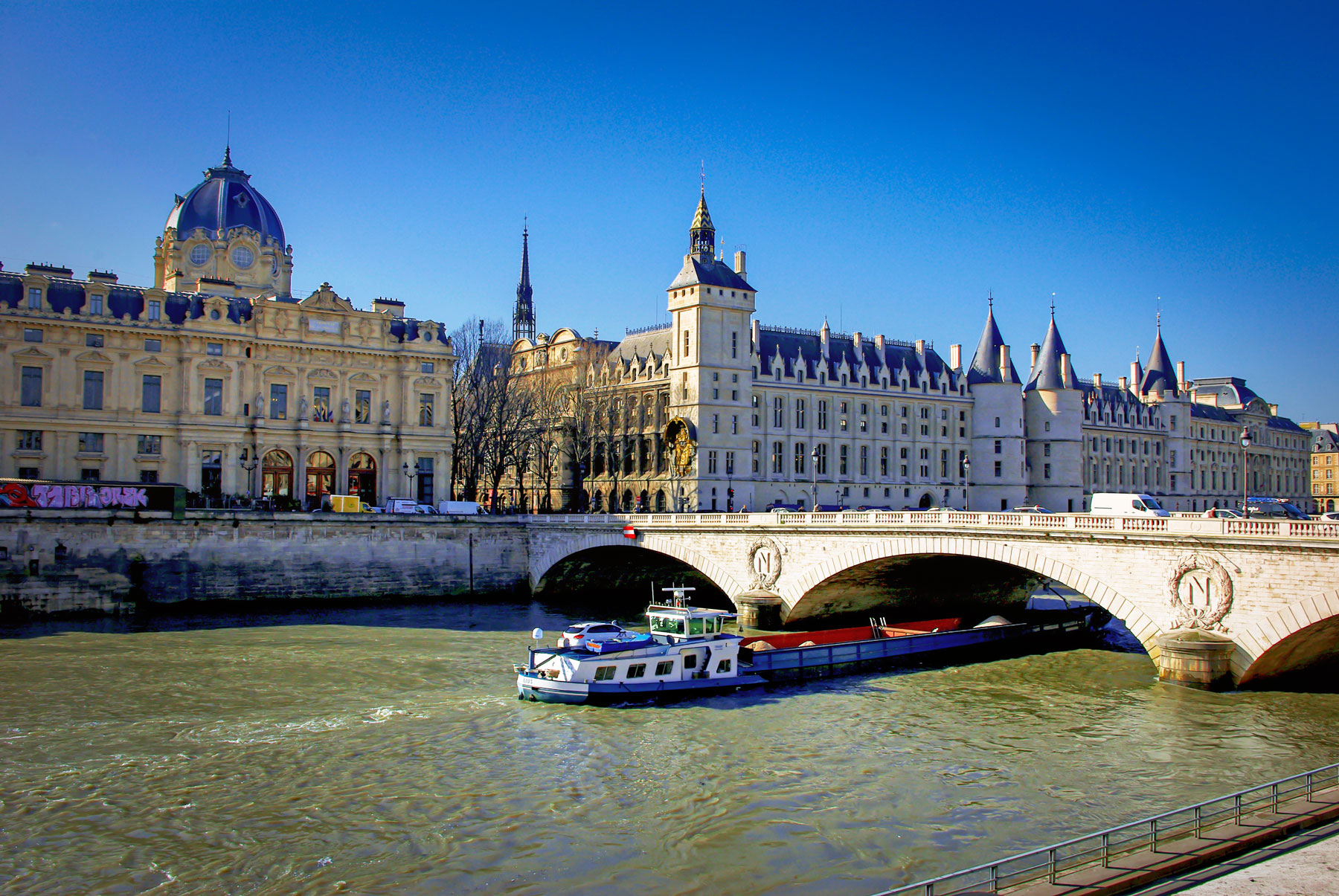
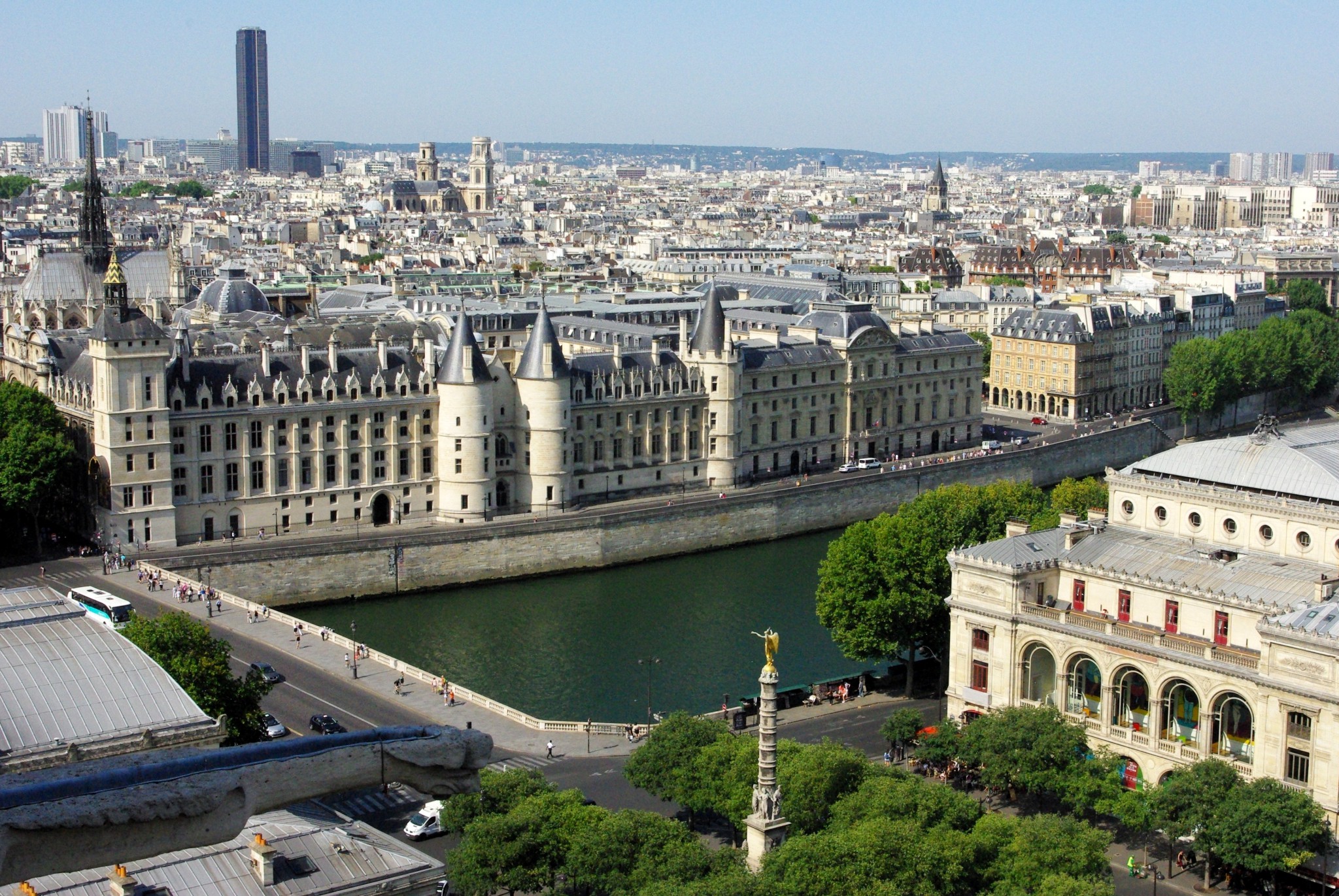
Where to stay in the 1st arrondissement?
Hotels in Paris vary from stunning luxurious places like the Ritz and the Meurice to much simpler hotels in charming older parts of the city.
However, due to its central location, you will find the prices of all types of accommodation relatively high in the 1st arrondissement.
Depending on your budget, you might want to find cheaper accommodation further away from the hypercentre of Paris!
Therefore, the district has more than 70 hotels totalling over 4,000 rooms.
Of these, eleven are 5-star hotels, including some of the most famous:
- the Hôtel Meurice
- the Hôtel du Louvre
- the Ritz (Place Vendôme)
- the Hôtel Costes
- the Grand Hôtel du Palais Royal
- the Hôtel Régina
Here is a map showing the nearest accommodation:
All photos © French Moments



